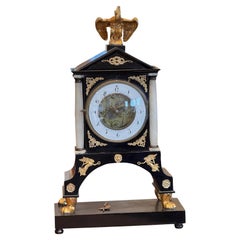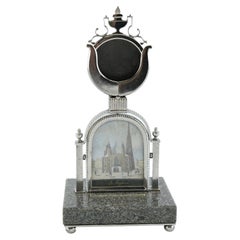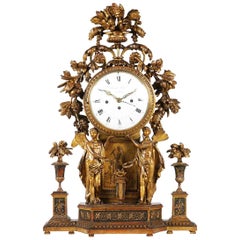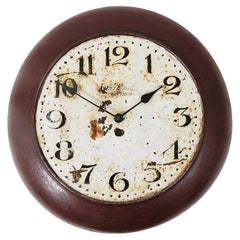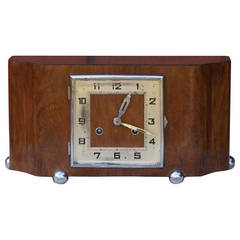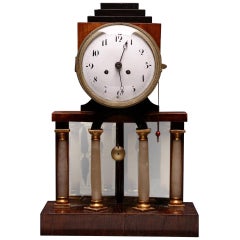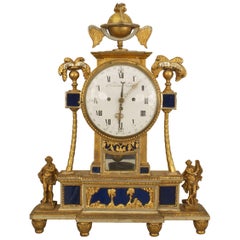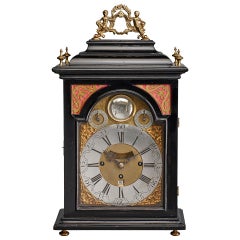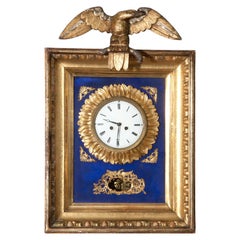Antique Austrian Clocks
Mid-19th Century Austrian Antique Austrian Clocks
Metal
Early 19th Century Austrian Empire Antique Austrian Clocks
Granite, Steel
Early 19th Century Austrian Neoclassical Antique Austrian Clocks
Giltwood
1920s Art Nouveau Antique Austrian Clocks
Metal, Iron
1920s Austrian Art Deco Antique Austrian Clocks
Nutwood, Softwood
19th Century Austrian Neoclassical Antique Austrian Clocks
Alabaster
18th Century and Earlier Austrian Neoclassical Antique Austrian Clocks
Giltwood, Glass
Mid-18th Century Austrian Baroque Antique Austrian Clocks
Brass
Early 19th Century Austrian Biedermeier Antique Austrian Clocks
Bronze
19th Century Austrian Antique Austrian Clocks
Glass, Giltwood
Late 19th Century Austrian Antique Austrian Clocks
Lapis Lazuli, Silver, Bronze, Enamel
18th Century Austrian Antique Austrian Clocks
Giltwood
1920s Antique Austrian Clocks
Metal
Mid-19th Century Austrian Belle Époque Antique Austrian Clocks
Silver, Enamel
18th Century Austrian Louis XVI Antique Austrian Clocks
Giltwood
Late 19th Century Austrian Black Forest Antique Austrian Clocks
Plaster, Wood, Antler
Late 19th Century German Antique Austrian Clocks
Wood
18th Century Austrian Antique Austrian Clocks
Giltwood
1910s Austrian Art Nouveau Antique Austrian Clocks
Burl
Late 19th Century Austrian Black Forest Antique Austrian Clocks
Wood, Plaster, Antler
1780s Austrian Baroque Antique Austrian Clocks
Metal
19th Century Austrian Biedermeier Antique Austrian Clocks
Maple
1840s Austrian Gothic Revival Antique Austrian Clocks
Granite, Steel
Early 19th Century Austrian Baroque Antique Austrian Clocks
Ormolu
Late 19th Century Austrian Rococo Antique Austrian Clocks
Silver
19th Century Austrian Biedermeier Antique Austrian Clocks
Ormolu
19th Century Austrian Antique Austrian Clocks
Silver, Enamel
19th Century Austrian Empire Antique Austrian Clocks
Bronze
1890s Austrian Antique Austrian Clocks
Lapis Lazuli, Silver
19th Century American Antique Austrian Clocks
Silver, Bronze
Late 18th Century Austrian Rococo Antique Austrian Clocks
Giltwood
Early 1900s Austrian Edwardian Antique Austrian Clocks
Silver, Sterling Silver, Enamel
19th Century Austrian Antique Austrian Clocks
Silver, Enamel
Early 19th Century Austrian Other Antique Austrian Clocks
Multi-gemstone, Enamel
Early 1900s Austrian Art Nouveau Antique Austrian Clocks
Brass
18th Century Austrian George III Antique Austrian Clocks
Ebony
1790s Austrian Empire Antique Austrian Clocks
Giltwood, Wood
1810s Austrian Biedermeier Antique Austrian Clocks
Maple
Late 19th Century Antique Austrian Clocks
Sterling Silver, Enamel
Early 1900s Austrian Jugendstil Antique Austrian Clocks
Brass
1920s Austrian Art Deco Antique Austrian Clocks
Brass
Early 1900s Austrian Antique Austrian Clocks
Marble
1870s Austrian Antique Austrian Clocks
Wood
19th Century Antique Austrian Clocks
Rock Crystal, Silver, Enamel
Early 19th Century Austrian Empire Antique Austrian Clocks
Marble, Bronze
1910s Austrian Vienna Secession Antique Austrian Clocks
Brass
Late 19th Century Austrian Antique Austrian Clocks
Porcelain
1820s Austrian Biedermeier Antique Austrian Clocks
Brass
19th Century Austrian Victorian Antique Austrian Clocks
Oak
19th Century Austrian Biedermeier Antique Austrian Clocks
Wood
Late 19th Century Austrian Jugendstil Antique Austrian Clocks
Bronze, Iron
1840s Austrian Biedermeier Antique Austrian Clocks
Fruitwood
Early 19th Century Austrian Empire Antique Austrian Clocks
Brass
1840s Austrian Biedermeier Antique Austrian Clocks
Brass
19th Century Austrian Art Nouveau Antique Austrian Clocks
Metal, Enamel
Early 19th Century Austrian Empire Antique Austrian Clocks
Bronze
Late 19th Century Austrian Neoclassical Antique Austrian Clocks
Silver, Enamel
Early 1900s Austrian Antique Austrian Clocks
Silver, Enamel
1880s Austrian Antique Austrian Clocks
Silver, Enamel
1870s Austrian Victorian Antique Austrian Clocks
Onyx, Silver, Enamel
- 1
Antique Austrian Clocks For Sale on 1stDibs
How Much are Antique Austrian Clocks?
Finding the Right Decorative-objects for You
Every time you move into a house or an apartment — or endeavor to refresh the home you’ve lived in for years — life for that space begins anew. The right home accent, be it the simple placement of a decorative bowl on a shelf or a ceramic vase for fresh flowers, can transform an area from drab to spectacular. But with so many materials and items to choose from, it’s easy to get lost in the process. The key to styling with antique and vintage decorative objects is to work toward making a happy home that best reflects your personal style.
Ceramics are a versatile addition to any home. If you’ve amassed an assortment of functional pottery over the years, think of your mugs and salad bowls as decorative objects, ideal for displaying in a glass cabinet. Vintage ceramic serveware can pop along white open shelving in your dining area, while large stoneware pitchers paired with woven baskets or quilts in an open cupboard can introduce a rustic farmhouse-style element to your den.
Translucent decorative boxes or bowls made of an acrylic plastic called Lucite — a game changer in furniture that’s easy to clean and lasts long — are modern accents that are neutral enough to dress up a coffee table or desktop without cluttering it. If you’re showcasing pieces from the past, a vintage jewelry box for displaying your treasures can spark conversation: Where is the jewelry box from? Is there a story behind it?
Abstract sculptures or an antique vessel for your home library can draw attention to your book collection and add narrative charm to the most appropriate of corners. There’s more than one way to style your bookcases, and decorative objects add a provocative dynamic. “I love magnifying glasses,” says Alex Assouline, global vice president of luxury publisher Assouline, of adding one’s cherished objects to a home library. “They are both useful and decorative. Objects really elevate libraries and can also make them more personal.”
To help with personalizing your space and truly making it your own, find an extraordinary collection of decorative objects on 1stDibs.
- 1stDibs ExpertApril 5, 2022Check the clock for a manufacturer’s mark or label. Once you have this, you should be able to look up the clock’s brand to see if it is French in origin. A clock is considered antique once it is 100 years old. A professional can also help verify the origin of your clock. Shop an array of expertly vetted antique clocks on 1stDibs.
- 1stDibs ExpertFebruary 27, 2024To identify your antique clock, search for markings on the back of its movement or case. Once you have located these marks, use trusted online resources to determine who the maker is. From there, you can continue your research to learn more about your clock's age, style and other characteristics. An expert appraiser or antiques dealer can also assist you with identification. Find a wide range of antique clocks on 1stDibs.
- How can I spot an antique clock?1 Answer1stDibs ExpertApril 5, 2022To spot whether or not a clock is antique, note if the clockmaker’s name or company is engraved near the center face of the dial. A paper label may also be pasted on the back of the clock. You can shop a collection of expertly vetted antique clocks from some of the world’s top sellers on 1stDibs.
- 1stDibs ExpertOctober 26, 2021An antique bracket clock refers to a portable spring-driven pendulum table clock created in the 17th and 18th centuries. These clocks were equipped with convenient carrying handles and were housed usually in rectangular cases. Shop a collection of antique and vintage bracket clocks from some of the world’s top dealers on 1stDibs.
- 1stDibs ExpertFebruary 17, 2023To know if an antique clock is valuable, you'll typically need to have the piece assessed by a certified appraiser or an experienced antiques dealer. The maker and style of the clock will help determine its value (an early American clockmaker’s antique grandfather model, featuring an oak case and decorative carvings, may be very interesting to collectors, for example). Overall condition of your clock also plays a role. Generally, clocks that still work are worth more than those that require repairs. On 1stDibs, find a selection of antique, vintage and modern clocks.
- 1stDibs ExpertSeptember 16, 2024Yes, some old antique clocks may be worth something. Many collectors look for clocks produced by certain manufacturers, such as the Ansonia Clock Company, the Seth Thomas Clock Company, Jaeger-LeCoultre and the Chelsea Clock Company. In addition to the maker, the type, materials, style and condition of the clock influence its value. Generally, clocks that remain in good working order are worth more than those in need of repairs and restorations. To find out how much your clock may be worth, consult a certified appraiser or experienced antique dealer. On 1stDibs, explore a large collection of antique clocks.
Read More
Kazuyo Sejima’s Flowering Tree Blooms Year-Round
The brilliantly simple design turns a modest bouquet into a major statement.
He Wrote ‘Oedipus Rex,’ but Do You Know What He Looked Like?
The Greek tragedian is said to have been handsome in his day.
Cigar Culture Was Once the Peak of Masculinity. Now, It’s a Compelling Curiosity
Even for those who don’t indulge, elegant smoking accessories and audacious art portraying cigar enthusiasts hold a nostalgic allure.
African Travel Plans on Hold? This Ardmore Leopard Vase Brings the Beauty of the Savanna to You
It’s an excellent example of the sought-after ceramics coming out of South Africa’s KwaZulu-Natal province.
With a High-Tech Flagship and Cool Collabs, Lladró Is Breaking the Mold for Porcelain Production
Thanks to its new leadership, the Spanish maker of figurines, busts and lighting is on a mission to update the art of porcelain for the 21st century.
Zoë Powell’s Magnolia 05 Vessel Is Handmade from Clay She Unearthed Herself
The free-form stoneware piece is inspired by the magnolia tree and its associations with home.
8 Ways to Breathe New Life into a Space with Plants
The pair behind the Instagram account @houseplantclub share their tips for making any room of the house gloriously green.
Paris Gallerist Sandy Toupenet Gets Fired Up over 20th-Century Ceramics and Inventive New Makers
Her space on the city’s Left Bank mixes mid-century pieces by the likes of Jean Cocteau and Pablo Picasso with whimsical contemporary creations.
